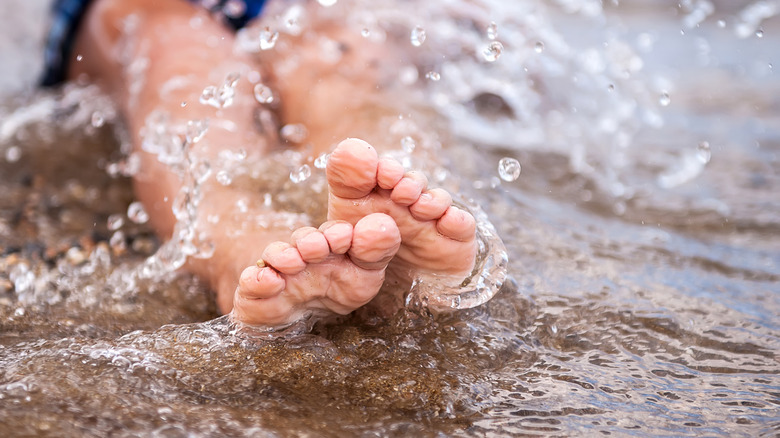The Reason Your Fingers Wrinkle In Water
It happens in the pool, the ocean, and even in the bathtub — suffice to say, wrinkly fingers are indescribably weird. Why do our fingers and toes wrinkle after a certain amount of time submerged in water? Well, the short answer is that nobody is really sure. But one explanation has come to the fore in recent years.
Jonathan Cluett, MD, writing for Verywell Health in April 2019, noted that first off, it doesn't happen due to osmosis, as many people originally believed (i.e. submerging your fingers or toes in water draws it into the skin, causing wrinkles). After all, if this was the case, all of our skin would wrinkle, not just fingers and toes.
Cluett advises that, although water may cause upper layers of the skin to swell, blood vessels and nerve endings also play an important part in this process. He points to the sympathetic nervous system, which controls heart rate and blood pressure, among other things. Peripheral blood vessels constrict when it's activated, diverting blood to major organs and the center of the body. This activation could arguably be the stimulus that leads to wrinkling. Likewise, when activation happens, blood vessels in the fingers constrict, decreased volume in the deep layers of soft tissue pulls the skin in, and wrinkles are formed.
Cluett put forward the proposed theory suggesting skin wrinkling provides better ability to grip objects with wet fingers, by creating "treads" similar to those on tires. Researchers found wrinkling funnels water away from the skin, allowing for a better grip, and people whose skin had wrinkled were better able to handle wet objects. This would make sense as to why wrinkling only happens on hands and feet, because the importance of grip only matters in those two key areas.
Neurobiologist Mark Changizi put forward the same theory in discussion with BBC, advising it's more than likely an adaptation technique developed as the human body has evolved over time. However, a 2014 study found there was no difference in grip, while a Taiwanese series of experiments found there was actually less of a grip. Regardless, Changizi reckons we won't know for sure until tests are done where subjects with wrinkled hands and feet try gripping onto trees, because the difference is in locomotion rather than dexterity.
